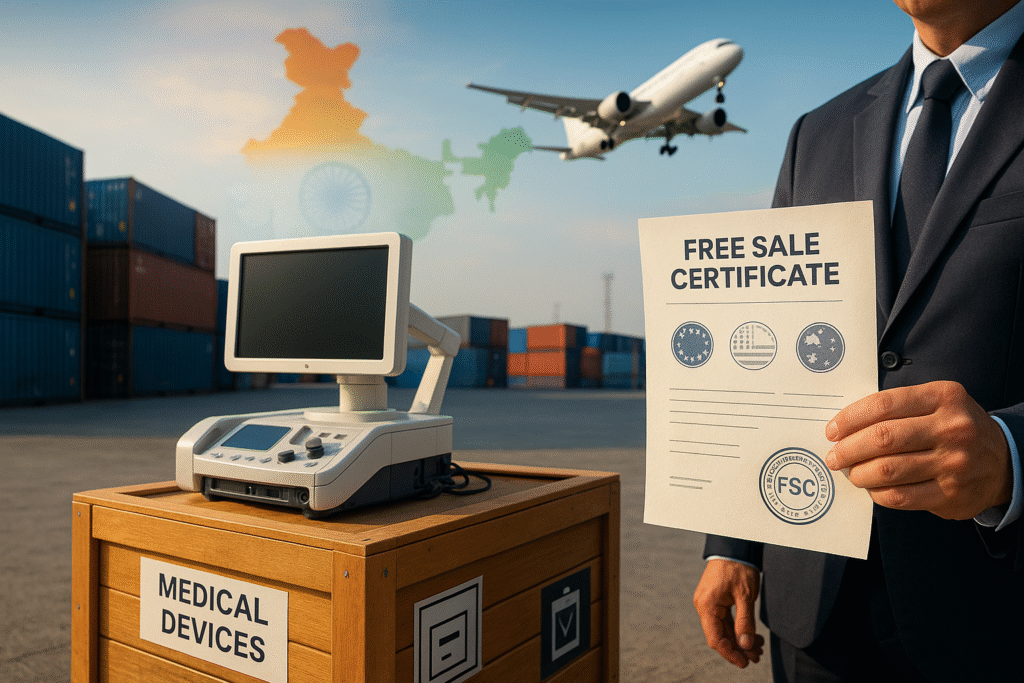Bringing a medical device into the Indian market is more than just ticking boxes—it’s about navigating a dense regulatory landscape, starting with the Free Sale Certificate (FSC). Whether you’re a foreign manufacturer seeking CDSCO registration or an Indian importer managing timelines and documentation, understanding Indian FSC requirements is critical for a smooth registration process.
This blog breaks down CDSCO regulations for imported devices, explains the role of the FSC, and highlights the most common challenges companies face during CDSCO import approval.
What is a Free Sale Certificate (FSC)?
A Free Sale Certificate (FSC) is an official document issued by the national regulatory authority of a country, certifying that a medical device is freely marketed and sold within that country. It assures CDSCO that the product meets safety and quality standards in its home market.
Globally, FSCs are used to facilitate exports and validate the commercial legitimacy of a medical device.
Purpose in CDSCO Medical Device Registration
Under the Medical Devices Rules, 2017, CDSCO mandates submission of an FSC for importing Class B, C, or D medical devices. The FSC serves as proof of safety and approval from the country of origin, making it a core component of your CDSCO submission.
When is an FSC Required in India?
CDSCO Requirements for Class B, C, D Devices
As per CDSCO guidelines and Form MD-14/15 procedures, an FSC is required when applying for:
- Import License (Form MD-15)
- Test License (Form MD-17) in certain cases
- Permission to import investigational devices (with exceptions)
Class A non-sterile and non-measuring devices imported into India are exempt from FSC under self-certification.
Acceptable Sources of FSC for CDSCO
CDSCO recognizes FSCs issued by:
- Regulatory authorities like US FDA, Health Canada, MHRA (UK), TGA (Australia), PMDA (Japan), etc.
- EU Notified Bodies with CE Mark and declaration
- Government-authorized chambers or ministries (subject to attestation)
What Makes an FSC Valid?
CDSCO insists on:
- Apostille or embassy attestation of the FSC
- Document alignment with the device name, model, and manufacturer address
- Issuance from a recognized health or regulatory authority (self-declared FSCs are not accepted)
Common Challenges in Importing Devices with FSC
Even experienced companies face obstacles during CDSCO import registration due to FSC issues:
1. Mismatch in Device Details
FSC may not mention the exact model number or variant listed in the application. CDSCO often rejects such documents or seeks clarification, causing delays.
2. Delays in Apostille/Legalisation
Obtaining apostille from the issuing country or legalizing via Indian embassy can take weeks or months, impacting project timelines.
3. Non-Acceptance of Self-Issued FSC
FSCs issued by manufacturers or third-party consultants are strictly rejected by CDSCO.
4. FSC Not Issued for Novel or Investigational Devices
Some regulatory bodies do not issue FSCs for devices under development or with limited market release, complicating CDSCO’s approval process.
Tips to Overcome Import Hurdles
1. Align FSC with Product Master File
Ensure device name, model, and indications on the FSC exactly match your CDSCO application and Device Master File.
2. Collaborate Early with Indian Authorised Agent
Your Indian Authorized Agent (IAA) can pre-screen documents and request clarifications from CDSCO in advance.
3. Plan for Country-Specific Legalisation
Know your origin country’s legalization path:
- Apostille Countries (Hague Convention): Simple apostille suffices
- Non-Apostille Countries: Embassy attestation required
Final Checklist for FSC Compliance
- Is your FSC issued by a CDSCO-accepted authority?
- Is the document apostilled or legalized?
- Do the device name and model match your CDSCO dossier?
- Is the FSC valid for the exact legal manufacturer and location?
- Have you attached a notarized copy in your CDSCO submission?
Conclusion:
The Free Sale Certificate is more than just a formality—it’s a make-or-break document for CDSCO import approval. Ensuring its accuracy, validity, and alignment with your application can save months of delay and prevent costly rejections.
If you’re struggling to get the FSC documentation right or facing delays in the CDSCO import process, consider partnering with an experienced regulatory consultant.
Need Help?
For expert guidance on FSC preparation, import registration, and Indian regulatory compliance, contact Titans Medical Consulting.
Sources:
- Central Drugs Standard Control Organisation (CDSCO): www.cdsco.gov.in
- Ministry of Health & Family Welfare (MoHFW), India: www.mohfw.gov.in
- Medical Devices Rules, 2017 – Latest Gazette Notifications
- CDSCO Guidance Document on Import & Registration of Medical Devices (2023 Edition)

